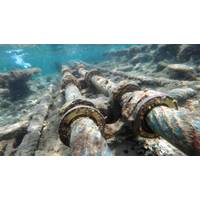EU Ministers Unite on Climate Mandate
EU ministers on Friday finalized what they said was a tough negotiating position for U.N. climate talks later this year after overcoming objections from coal-reliant Poland.
Poland's elections next month complicated the debate as the right-wing Law and Justice party has been campaigning on a promise to resist EU environment law and protect the coal industry.
But Friday's talks were quicker than expected, as EU officials said Poland realised it was isolated and agreed to word changes that made no substantial difference.
"It is a compromise ... but it will lead the way to an ambitious, robust, dynamic climate agreement," Carole Dieschbourg, environment minister for Luxembourg, holder of the EU rotating presidency, told a news conference.
European Climate and Energy Commissioner Miguel Arias Canete said Friday was a good day and ensured the 28-member EU would be "a deal-maker, not a deal-taker" in Paris, where U.N. talks begin on Nov. 30. The bloc would not sign a global pact that was not ambitious enough, he said.
The EU has already submitted a pledge to the United Nations to cut emissions by at least 40 percent versus 1990 levels.
In addition, the mandate agreed on Friday says greenhouse gas emissions need to peak by 2020 at the latest and be reduced by at least 50 percent by 2050 versus 1990 levels.
It also promises five-year reviews to ensure progress and stresses that all parties must pursue "a long-term vision of global and sustainable climate neutrality".
The haggling to accommodate Poland substituted a long-term goal of 60 percent versus 2010 levels with one of at least 50 percent versus 1990, which EU officials said was effectively the same.
It also switched the word decarbonization with "climate neutrality". Polish officials said that allowed for technological solutions, such as carbon capture and storage, to do some of the work, reducing the need to change the fuel mix.
As the host of the U.N. talks, France was particularly keen for a deal on Friday.
Segolene Royal, France's environment minister, said EU nations, faced with a migrant crisis that could be aggravated by factors such as desertification and drought, had shown "very strong unity".
Environment campaigners said the EU position was too weak.
They are calling for the rapid phase-out of fossil fuels, particularly coal, the most polluting of them all.
A group of non-governmental organizations staged a tug-of-war between fossil fuel and renewables outside the Brussels talks, which the green team won.
"The EU's position is still far from what is needed to reach an effective global deal," Greenpeace EU energy policy adviser Jiri Jerabek said.
(By Barbara Lewis)



